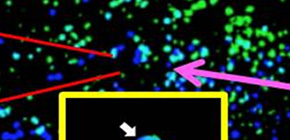
MicroRNAs induce epigenetic reprogramming and suppress malignant phenotypes of human colon cancer cells
Possible applications in innovative treatment for intractable cancers
In collaboration with the Department of Surgery, Osaka University (Profs. Masaki Mori and Yuichiro Doki ), Ogawa (Student in a doctoral program) et al. showed the data that cancer reprogramming may be a useful treatment for chemo- or radiotherapy-resistant cancer cells. The introduction of microRNA (miR) resulted in epigenetic reprogramming of DNA demethylation and histone modification events. In vivo administration of the ribonucleotides in mice elicited the induction of cancer cell apoptosis. The present study shows that the introduction of miRs could induce cellular reprogramming and modulate malignant phenotypes of human colorectal cancer, suggesting that the appropriate delivery of functional small-sized ribonucleotides may open a new avenue for therapy against human malignant tumors.
Abstract
Although cancer is a genetic disease, epigenetic alterations are involved in its initiation and progression. Previous studies have shown that reprogramming of colon cancer cells using Oct3/4, Sox2, Klf4, and cMyc reduces cancer malignancy. Therefore, cancer reprogramming may be a useful treatment for chemo- or radiotherapy-resistant cancer cells. It was also reported that the introduction of endogenous small-sized, non-coding ribonucleotides such as microRNA (miR) 302s and miR-369-3p or -5p resulted in the induction of cellular reprogramming. miRs are smaller than the genes of transcription factors, making them possibly suitable for use in clinical strategies. Therefore, we reprogrammed colon cancer cells using miR-302s and miR-369-3p or -5p. This resulted in inhibition of cell proliferation and invasion and the stimulation of the mesenchymal-to-epithelial transition phenotype in colon cancer cells. Importantly, the introduction of the ribonucleotides resulted in epigenetic reprogramming of DNA demethylation and histone modification events. Furthermore, in vivo administration of the ribonucleotides in mice elicited the induction of cancer cell apoptosis, which involves the mitochondrial Bcl2 protein family. The present study shows that the introduction of miR-302s and miR-369s could induce cellular reprogramming and modulate malignant phenotypes of human colorectal cancer, suggesting that the appropriate delivery of functional small-sized ribonucleotides may open a new avenue for therapy against human malignant tumors.
The innovative medicine of nucleotides would open an avenue to treat cancer stem cells in patients with intractable gastrointestinal cancer.
To learn more about this research, please view the full research report entitled " MicroRNAs Induce Epigenetic Reprogramming and Suppress Malignant Phenotypes of Human Colon Cancer Cells " at this page of the PLOS ONE website.
Related link
